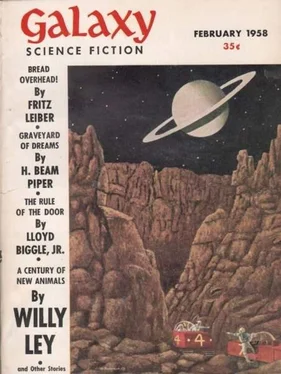Уолтер Тевис - The Big Bounce
Здесь есть возможность читать онлайн «Уолтер Тевис - The Big Bounce» весь текст электронной книги совершенно бесплатно (целиком полную версию без сокращений). В некоторых случаях можно слушать аудио, скачать через торрент в формате fb2 и присутствует краткое содержание. Год выпуска: 1958, Издательство: Galaxy Publishing Corporation, Жанр: Фантастика и фэнтези, на английском языке. Описание произведения, (предисловие) а так же отзывы посетителей доступны на портале библиотеки ЛибКат.
- Название:The Big Bounce
- Автор:
- Издательство:Galaxy Publishing Corporation
- Жанр:
- Год:1958
- ISBN:нет данных
- Рейтинг книги:5 / 5. Голосов: 1
-
Избранное:Добавить в избранное
- Отзывы:
-
Ваша оценка:
- 100
- 1
- 2
- 3
- 4
- 5
The Big Bounce: краткое содержание, описание и аннотация
Предлагаем к чтению аннотацию, описание, краткое содержание или предисловие (зависит от того, что написал сам автор книги «The Big Bounce»). Если вы не нашли необходимую информацию о книге — напишите в комментариях, мы постараемся отыскать её.
The Big Bounce — читать онлайн бесплатно полную книгу (весь текст) целиком
Ниже представлен текст книги, разбитый по страницам. Система сохранения места последней прочитанной страницы, позволяет с удобством читать онлайн бесплатно книгу «The Big Bounce», без необходимости каждый раз заново искать на чём Вы остановились. Поставьте закладку, и сможете в любой момент перейти на страницу, на которой закончили чтение.
Интервал:
Закладка:
The Big Bounce
By WALTER S. TEVIS
Seeing it in action, anybody would quaver in alarm: What hath Farnsworth overwrought?
"LET me show you something,” Farnsworth said. He set his near-empty drink—a Bacardi martini—on the mantel and waddled out of the room toward the basement.
I sat in my big leather chair, feeling very peaceful with the world, watching the fire. Whatever Farnsworth would have to show to-night would be far more entertaining than watching T.V.—my custom on other evenings. Farnsworth, with his four labs in the house and his very tricky mind, never failed to provide my best night of the week.
When he returned, after a moment, he had with him a small box, about three inches square. He held this carefully in one hand and stood by the fireplace dramatically—or as dramatically as a very small, very fat man with pink cheeks can stand by a fireplace of the sort that seems to demand a big man with tweeds, pipe and, perhaps, a saber wound.
Anyway, he held the box dramatically and he said, “Last week, I was playing around in the chem lab, trying to make a new kind of rubber eraser. Did quite well with the other drafting equipment, you know, especially the dimensional curve and the photosensitive ink. Well, I approached the job by trying for a material that would absorb graphite without abrading paper.”
I was a little disappointed with this; it sounded pretty tame. But I said, “How did it come out?”
HE screwed his pudgy face up thoughtfully. “Synthesized the material, all right, and it seems to work, but the interesting thing is that it has a certain—ah—secondary property that would make it quite awkward to use. Interesting property, though. Unique, I am inclined to believe.”
This began to sound more like it. “And what property is that?” I poured myself a shot of straight rum from the bottle sitting on the table beside me. I did not like straight rum, but I preferred it to Farnsworth’s rather imaginative cocktails.
“I’ll show you, John,” he said. He opened the box and I could see that it was packed with some kind of batting. He fished in this and withdrew a gray ball about the size of a golfball and set the box on the mantel.
“And that’s the—eraser?” I asked.
“Yes,” he said. Then he squatted down, held the ball about a half-inch from the floor, dropped it.
It bounced, naturally enough. Then it bounced again. And again. Only this was not natural, for on the second bounce the ball went higher in the air than on the first, and on the third bounce higher still. After a half minute, my eyes were bugging out and the little ball was bouncing four feet in the air and going higher each time.
I grabbed my glass. “What the hell!” I said.
Farnsworth caught the ball in a pudgy hand and held it. He was smiling a little sheepishly. “Interesting effect, isn’t it?”
“Now wait a minute,” I said, beginning to think about it. “What’s the gimmick? What kind of motor do you have in that thing?”
His eyes were wide and a little hurt. “No gimmick, John. None at all. Just a very peculiar molecular structure.”
“Structure!” I said. “Bouncing balls just don’t pick up energy out of nowhere, I don’t care how their molecules are put together. And you don’t get energy out without putting energy in.”
“Oh,” he said, “that’s the really interesting thing. Of course you’re right; energy does go into the ball. Here, I’ll show you.”
He let the ball drop again and it began bouncing, higher and higher, until it was hitting the ceiling. Farnsworth reached out to catch it, but he fumbled and the thing glanced off his hand, hit the mantelpiece and zipped across the room. It banged into the far wall, richocheted, banked off three other walls, picking up speed all the time.
When it whizzed by me like a rifle bullet, I began to get worried, but it hit against one of the heavy draperies by the window and this damped its motion enough so that it fell to the floor.
IT started bouncing again immediately, but Farnsworth scrambled across the room and grabbed it. He was perspiring a little and he began instantly to transfer the ball from one hand to another and back again as if it were hot.
“Here,” he said, and handed it to me.
I almost dropped it.
“It’s like a ball of ice!” I said. “Have you been keeping it in the refrigerator?”
“No. As a matter of fact, it was at room temperature a few minutes ago.”
“Now wait a minute,” I said. “I only teach physics in high school, but I know better than that. Moving around in warm air doesn’t make anything cold except by evaporation.”
“Well, there’s your input and output, John,” he said. “The ball lost heat and took on motion. Simple conversion.”
My jaw must have dropped to my waist. “Do you mean that that little thing is converting heat to kinetic energy?”
“Apparently.”
“But that’s impossible!”
He was beginning to smile thoughtfully. The ball was not as cold now as it had been and I was holding it in my lap.
“A steam engine does it,” he said, “and a steam turbine. Of course, they’re not very efficient.”
“They work mechanically, too, and only because water expands when it turns to steam.”
“This seems to do it differently,” he said, sipping thoughtfully at his dark-brown martini. “I don’t know exactly how—maybe something piezo-electric about the way its molecules slide about. I ran some tests—measured its impact energy in foot pounds and compared that with the heat loss in BTUs. Seemed to be about 98 per cent efficient, as close as I could tell. Apparently it converts heat into bounce very well. Interesting, isn’t it?”
“ Interesting? ” I almost came flying out of my chair. My mind was beginning to spin like crazy. “If you’re not pulling my leg with this thing, Farnsworth, you’ve got something by the tail there that’s just a little bit bigger than the discovery of fire.”
He blushed modestly. “I’d rather thought that myself,” he admitted.
“Good Lord, look at the heat that’s available!” I said, getting really excited now.
FARNSWORTH was still smiling, very pleased with himself. “I suppose you could put this thing in a box, with convection fins, and let it bounce around inside—”
“I’m way ahead of you,” I said. “But that wouldn’t work. All your kinetic energy would go right back to heat, on impact—and eventually that little ball would build up enough speed to blast its way through any box you could build.”
“Then how would you work it?”
“Well,” I said, choking down the rest of my rum, “you’d seal the ball in a big steel cylinder, attach the cylinder to a crankshaft and flywheel, give the thing a shake to start the ball bouncing back and forth, and let it run like a gasoline engine or something. It would get all the heat it needed from the air in a normal room. Mount the apparatus in your house and it would pump your water, operate a generator and keep you cool at the same time!”
I sat down again, shakily, and began pouring myself another drink.
Farnsworth had taken the ball from me and was carefully putting it back in its padded box. He was visibly showing excitement, too; I could see that his cheeks were ruddier and his eyes even brighter than normal. “But what if you want the cooling and don’t have any work to be done?”
“Simple,” I said. “You just let the machine turn a flywheel or lift weights and drop them, or something like that, outside your house. You have an air intake inside. And if, in the winter, you don’t want to lose heat, you just mount the thing in an outside building, attach it to your generator and use the power to do whatever you want—heat your house, say. There’s plenty of heat in the outside air even in December.”
Читать дальшеИнтервал:
Закладка:
Похожие книги на «The Big Bounce»
Представляем Вашему вниманию похожие книги на «The Big Bounce» списком для выбора. Мы отобрали схожую по названию и смыслу литературу в надежде предоставить читателям больше вариантов отыскать новые, интересные, ещё непрочитанные произведения.
Обсуждение, отзывы о книге «The Big Bounce» и просто собственные мнения читателей. Оставьте ваши комментарии, напишите, что Вы думаете о произведении, его смысле или главных героях. Укажите что конкретно понравилось, а что нет, и почему Вы так считаете.












